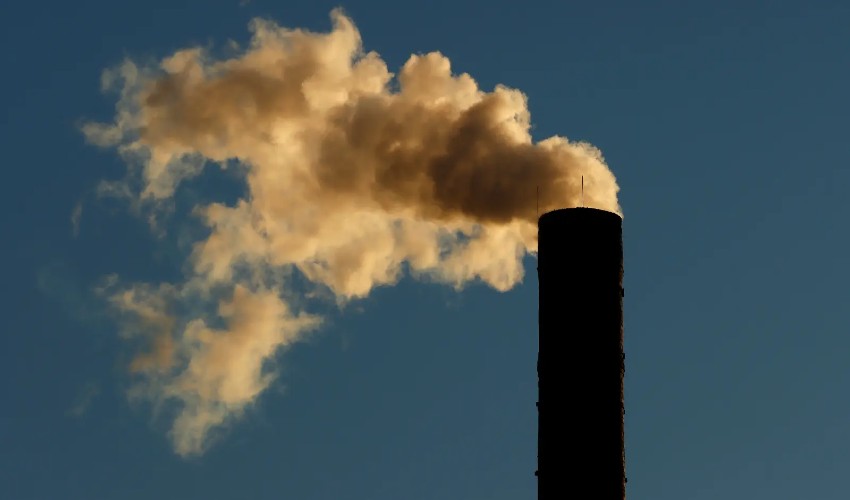Air pollution has become a challenge in Pakistan for the last few years.
According to experts, brick kilns are causingimmense pollution by emitting highly toxic fumes in the air.
The government has also directed these brick kilns toshift to new technology. The toxic fumes of kilns are not only proving to be an environment-friendly enemy of air.pollution, but also a threat to human lives.
Especially the lives of young children working in kilns are dangerous. It is a sad situation that children working in brick kilns in Pakistan are among the most vulnerable and exploited workers in the country.
Despite being the most affected by environmental and air pollution, they suffer long hours.of heavy work in harsh and dangerous conditions, low wages, debt slavery, lack of education, food shortages,health problems and human rights violations.
Child labor is a global problem that deprives children of their basicrights. It hinders their development. Children spend their childhood days in kilns instead of getting an education andenjoying their childhood.
Most of the children in the kilns are suffering from malnutrition. Children who work aremore likely to be malnourished, resulting in stunted growth, weakened immune systems, and increased susceptibility to disease.
Working in a ventilated environment with a lack of nutrition, the breathing environmentis a threat to children's lives.According to a survey by the Trust for Democratic Education and Accountability, Seven percent of children work in the kilns.
The average age of these children is ten, while some are as young as five.years old. These children work 14 hours a day, making bricks, carrying heavy loads, mixing mud, or feeding coal tokilns.
They are exposed to extreme heat, dust, fumes, and toxins that cause respiratory infections, skin diseases,eye problems and injuries.According to the report of the World Health Organisation, more than 30 million children in the world are suffering.from malnutrition.
So far, the problem of malnutrition has arisen in 15 countries. The report stated that the healthof 8 million children suffering from malnutrition has become unhealthy. Climate change, Corona, conflicts, and therising cost of living are causing an increasing number of children to suffer from severe malnutrition.
According to WHO, more than 40% of children under the age of five in Pakistan are stunted (stunting), while 2.5 million childrenare severely malnourished. Nasreen, who works in a kiln in the rural area of Tiramari Chowk, Rawalpindi, and works with her three childrenand her husband.
Nasreen says that kiln work is our family business. I have seen my parents working at the kiln. II was married at the age of twelve, and I have three children, apart from them, one son died. He was very thin frombirth. Nasreen says that at the time of my child's birth, there was no adequate food, so the child has been deprived of mother's milk.
As these children have grown up, they still mostly survive on dry bread. Children also make a lotof noise to eat fruit. We do not allow the child to eat other things because there is no resource and if the childbecomes addicted again, we make noise.
Nasreen said that sometimes food items are provided by a welfare organization, so that day is Eid for children. My husband has taken a loan for two years and he is also paying it. There is no system in our houses; the work in thekiln is so much that even the children have to join. Nasreen says that good food is not even in our imagination, it isdifficult to complete one meal for children. Even if the children are sick, they do not give food or treatment, butthe children themselves also recover.
People from the government or institutions come, talk and go, but none ofthem solves the problems of our situation. We do not stop working in the kiln because we have seen this skill sincechildhood. Now our children also prepare their food with the same work.
Bushra Iqbal, a media trainer and social worker from Islamabad, the capital of Pakistan, runs a nationwidecampaign called Maffooz Bachpan".
Bushra Iqbal says that no government or non-government organisation hasany data about children working in kilns across the country. Bhatta Maafa is active even though the laws are being passed in the country, and there are voices being raised about the rights and protection of children working in thekilns at the international level as well.
Generations of families are destroyed in the name of loans. The journeyfrom the birth of the children to their youth in the kilns becomes a sight of the hard work of the kilns. He said that the poverty-stricken parents are worried about paying the debt instead of giving milk and food to their children.
It is a very sad situation that the children working in the kilns are deprived of basic food while at the time of birth the Children need milk for better growth but the children of the kilns suffering from malnutrition.
The children of the kilns are malnourished from childhood, so the immunesystem is also badly affected and due to the release of highly toxic smoke in the atmosphere of the brick kilns, thehealth of the children is badly affected and this affects the children. Also affects years of life.
He says that theproblems faced by children working in kilns are among the violations of human rights.According to the Sustainable Development Policy Institute (SDPI), Pakistan needs to improve the labor force in thecountry under international and national commitments. Especially labor intensive sectors like brick kilns need toadapt to socially and environmentally sound transition mechanisms.
In 2015, Pakistan's Decent Work Country Program, including the provincial government, the Employers; Federation of Pakistan, and the International LabourOrganization, and the Pakistan Workers; Federation signed an agreement. Pakistan Decent Work Programme wasextended to 2022 (PDWP-III, 2016-2020).
Some civil society organizations are working for hope and change for child laborers in brick kilns in Pakistan, raisingawareness about rights and entitlements, such as low wages, social security, health care, They are trying foreducation, identity card, legal help.
The Pakistani research institute Sustainable Development Policy Institute (SDPI) has developed a framework for the implementation of UN SDGs and ILO conventions in this regard. This framework facilitates the implementation ofof UN SDGs and ILO labor laws. Pakistan is committed to implementing a framework on the UN SDGs.
These SDGs goals and its framework relate to the provision of fundamental rights to all citizens living in Pakistan. The goals ofthese SDGs are a formal framework for implementation, with SDG 8, SDG 12 and SDG 13 being the goals that mustimprove the working environment for workers.
Environment should not be polluted. Washroom facilities, i.e. they have access to clean drinking water, May they have access to health and education for their children.
This framework for workers includes implementation of labor laws, their registration, and registration in EOBI for them.etc.The Sustainable Development Policy Institute (SDPI) is identifying the problem in the brick kiln industry and takingpractical steps to address the problem.
According to Berklin has laid the foundation stone of its major initiative onthe framework.
This framework is in accordance with the principles of the International Labour rganization. After extensiveresearch SDPI has also presented a blueprint for dealing with social, environmental issues of brick kiln workers.
SDPI wants to ensure that brick kilns adhere to environmental standards and social labour regulations. SDPI advocates adoption of cleaner technologies and the reduction of environmental hazards associated withwith brick kiln operations.
This framework not only seeks to improve the working conditions of brick kiln workers,but also aims to protect the environment for future generations.
SDPI is an effort to ensure that brick kiln workers are provided adequate working parameters for workers with adequate wages and compensation including pension, social security, and A safe workplace, need to be provided.At present, most of the brick kiln owners do not pay their dues to these institutions, due to which their workers aredeprived of these facilities.
According to the social and environmental framework, the Berkeley framework (SECBKF) provided various incentive models below.SDPI also focuses on zero tolerance for child and bonded labor at brick kilns, supports the Department of Laborand Education/Literacy to set up schools for children of labourers, youth at brick kilns and supports theestablishment of adult literacy centers for adults, emphasizes equal work opportunities and wages for male andfemale workers, freedom to join associations and unions, and unions affiliated with federations.
It may be noted that according to the International Labour Organisation (ILO), Pakistan has ratified the Convention.on the Rights of the Child (CRC) and the Minimum Age Convention (C138), which prohibit child labour andThe minimum age for entry into employment has been fixed at 15 years.
However, Pakistan has not ratified the worstForms of Child Labour Convention (C182), which covers the most harmful forms of child labour, such as slavery,trafficking, forced labour, debt slavery, hazardous work and involvement in armed conflict. Defines and prohibits.
Furthermore, Pakistan's domestic laws are inconsistent and inadequate in addressing child labor issues.



























